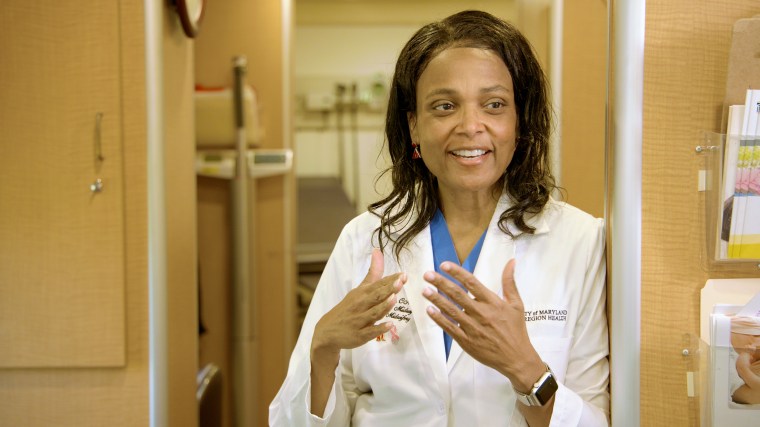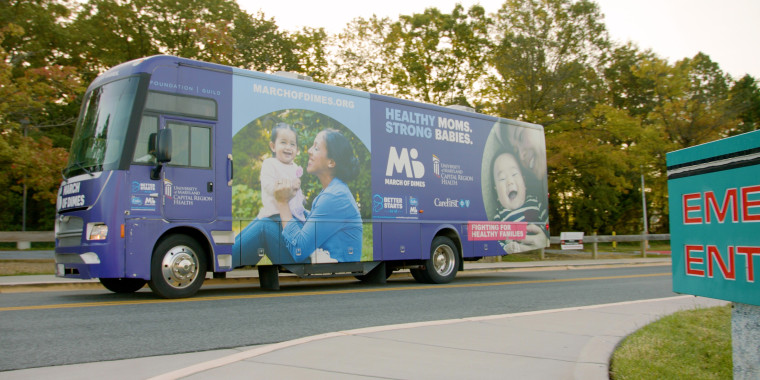Every day women in the U.S. become pregnant and, after the initial excitement, are hit with a harsh realization: They won't be able to have prenatal care.
Many of these women live in maternity care deserts, areas that do not have any hospitals providing obstetric care, birth centers or practicing OB-GYNs or midwives. Others don't have reliable transportation to travel to and from appointments. Some realize they simply can't afford the care they need.
"So they say, I'll wait," said Billie Hamilton-Powell, a certified nurse-midwife in Washington, D.C. "They don't come in until it's time to have the baby."

By then, it's often too late to manage any pregnancy-related complications, which experts believe is contributing to the poor maternal and infant mortality and morbidity rates in the U.S., particularly among women of color.
"Gestational diabetes, hypertension, preeclampsia — these are conditions that can have a major negative impact on both mom and baby," said Dr. Eve Espey, an OB-GYN and professor at the University of New Mexico in Albuquerque. "Those are conditions that are screened for during standard prenatal care and there are medications and other behavioral modifications that can lead to much better outcomes when those conditions are diagnosed early."
But in some cities, a temporary solution has emerged: buses equipped with exam rooms and practitioners that drive right into underserved communities, bringing quality care directly to people who it need the most.
Hamilton-Powell is a midwife on a mobile unit that serves women in Southeast D.C., an area that has no hospital where people can give birth and limited access to obstetric providers. Specifically, she works in Ward 7 and Ward 8, mostly Black areas with median incomes that are less than half of the district's overall median, according to DC Health Matters. They also have the highest rates of infant mortality across the district, according to data from the D.C. Department of Health.
"Most people think of a mobile unit being out in a rural area," she said. "When you think of a metropolitan area, you don't think of women saying, 'I can't get to my doctor's visit.' But when you have a couple hospitals close down their OB units and the nearest hospitals are across town, that's a health desert, and that becomes a problem."
Her bus parks outside of community centers on various weekdays and works with local community and religious leaders to get the word out about their services, which are offered for no charge and go beyond prenatal care; Hamilton-Powell's team will help moms get healthy groceries if they need help feeding their families, administer flu shots or birth control, or help patients sign up for health insurance if they're struggling with the paperwork, for example.
"We’ve got to understand that we just don't take care of just the body," she said. "There are social aspects to health care that we have to also address as well. That is part of how we take care of the whole woman."
Money is the biggest concern for her patients, a problem that's only gotten worse during the COVID-19 pandemic, as many of them lost their jobs or became sick with the virus. Many are also worried about being undocumented citizens. Gaining their trust took time, Hamilton-Powell said.
"Whether it's my African-American patients, my Afghani patients, my Hispanic patients, they're scared," she said. "When we first started, we had no patients at all. We had to really be accepted and embraced into the community, to help people understand that we were a safe space."
The bus is part of a pilot program from Better Starts for All, an organization focused on supporting the health of new moms and babies, and also includes other initiatives to help people in maternity care deserts, including telemedicine and online prenatal education.
This week, Better Starts for All launched in a new area: Southeast Ohio, a rural part of the state that's in dire need of services, according to Abra Greenberg, head of the new program.
"Every maternity care desert has its challenges," Greenberg told TODAY. "Southeast Ohio has a lot of challenges. They have issues with internet and Wi-Fi connection — it's very unstable. They have issues with transportation. There aren't really any public transit services out there. They have challenges with housing. They have challenges with food. They have challenges with opioid use and substance abuse. All of these barriers to access to care exist there."
Greenberg is working with the local Medicaid office and Women, Infant and Children (WIC) program as well as the county health department to get the word out about the new services and find out the best way to reach patients there.
"This will eliminate the need for women to travel from Southeast Ohio to Columbus (for care), which is about a 1 1/2 to 2-hour drive each way," she said. "This is really an opportunity for us to bring health care to those who need it the most without making them travel."
Better Starts for All may expand the initiative to other cities in the future.
More than 2.2 million women of childbearing age in the U.S. live in maternity care deserts, according to a report from the March of Dimes. And millions more live in areas with limited access to care.
"They're sadly more common than we would like to see," Greenberg said. "Part of the challenge with maternity care deserts is that they happen everywhere. It's not in one particular geographic area or one particular setting. There isn't a clear reason why."
More than 2.2 million women of childbearing age in the U.S. live in maternity care deserts.
In rural areas, experts point to the sheer logistics of supply and demand.
"I think about New Mexico, where I live," Espey said. "It's the fifth largest state geographically but has a total population of two million. It is challenging to provide maternity care services with small pockets of population. It's expensive, and it's tough for providers who can often be professionally isolated being in areas with no backup providers."
She believes mobile units likes the ones from Better Starts for All are a piece of the puzzle when it comes to erasing maternity deserts — but much more needs to be done. As examples, expanding Medicaid and access to midwifery would help, she said.
For Hamilton-Powell, the benefits of mobile care are visible every day.
"The stories I hear from women who come through my bus touch my heart," she said. "I cry with them. They don't have any money and they just want their baby to be taken care of, like any other woman. They're so grateful. I just hug them and tell them we will take care of them."


